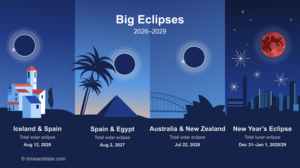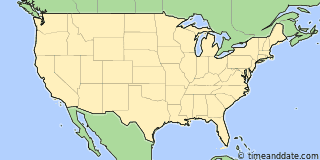| Current Time: | Sep 10, 2025 at 11:40:47 am |
|---|---|
| Moon Direction: | ↑ 308° Northwest |
| Moon Altitude: | -24.8° |
| Moon Distance: | 364,819 km |
| Next New Moon: | Sep 21, 2025, 12:54 pm |
| Next Full Moon: | Oct 6, 2025, 8:47 pm |
| Next Moonrise: | Today, 8:26 pm |
Moonrise, Moonset, and Phase Calendar for Goodyear, August 2025
Scroll right to see more
| 2025 | Moonrise/Moonset | Meridian Passing | ||||||||
|---|---|---|---|---|---|---|---|---|---|---|
| Aug | Moonrise | Moonset | Moonrise | Time | Distance (km) | Illumination | ||||
|
|
1:20 pm | ↑ (114°) | 11:42 pm | ↑ (244°) | - | 6:34 pm | (35.1°) | 404,134 | 55.2% | |
| 2 | 2:19 pm | ↑ (119°) | - | - | 7:20 pm | (31.4°) | 403,188 | 64.8% | ||
| 3 | - | 12:17 am | ↑ (239°) | 3:18 pm | ↑ (123°) | 8:10 pm | (28.7°) | 400,973 | 73.9% | |
| 4 | - | 12:59 am | ↑ (236°) | 4:16 pm | ↑ (125°) | 9:03 pm | (27.4°) | 397,681 | 82.3% | |
| 5 | - | 1:48 am | ↑ (235°) | 5:11 pm | ↑ (125°) | 9:57 pm | (27.5°) | 393,591 | 89.4% | |
| 6 | - | 2:45 am | ↑ (236°) | 6:00 pm | ↑ (123°) | 10:52 pm | (29.3°) | 389,058 | 95.0% | |
| 7 | - | 3:47 am | ↑ (238°) | 6:44 pm | ↑ (119°) | 11:46 pm | (32.7°) | 384,442 | 98.6% | |
| 8 | - | 4:53 am | ↑ (243°) | 7:21 pm | ↑ (114°) | Moon does not pass the meridian on this day. | ||||
|
|
- | 6:00 am | ↑ (249°) | 7:54 pm | ↑ (107°) | 12:37 am | (37.4°) | 380,104 | 99.9% | |
| 10 | - | 7:07 am | ↑ (256°) | 8:25 pm | ↑ (99°) | 1:27 am | (43.3°) | 376,327 | 98.7% | |
| 11 | - | 8:14 am | ↑ (265°) | 8:53 pm | ↑ (91°) | 2:15 am | (49.9°) | 373,315 | 94.9% | |
| 12 | - | 9:20 am | ↑ (273°) | 9:22 pm | ↑ (83°) | 3:02 am | (56.9°) | 371,147 | 88.5% | |
| 13 | - | 10:27 am | ↑ (281°) | 9:52 pm | ↑ (75°) | 3:49 am | (63.9°) | 369,837 | 79.9% | |
| 14 | - | 11:36 am | ↑ (289°) | 10:26 pm | ↑ (68°) | 4:39 am | (70.5°) | 369,311 | 69.6% | |
|
|
- | 12:48 pm | ↑ (296°) | 11:06 pm | ↑ (62°) | 5:32 am | (76.4°) | 369,465 | 58.1% | |
| 16 | - | 1:59 pm | ↑ (301°) | 11:53 pm | ↑ (57°) | 6:28 am | (81.0°) | 370,206 | 46.2% | |
| 17 | - | 3:09 pm | ↑ (304°) | - | 7:28 am | (84.0°) | 371,479 | 34.5% | ||
| 18 | 12:48 am | ↑ (55°) | 4:13 pm | ↑ (305°) | - | 8:30 am | (85.1°) | 373,261 | 23.7% | |
| 19 | 1:51 am | ↑ (56°) | 5:08 pm | ↑ (303°) | - | 9:32 am | (84.1°) | 375,547 | 14.5% | |
| 20 | 2:59 am | ↑ (59°) | 5:53 pm | ↑ (299°) | - | 10:30 am | (81.3°) | 378,349 | 7.4% | |
| 21 | 4:08 am | ↑ (63°) | 6:31 pm | ↑ (293°) | - | 11:24 am | (77.0°) | 381,639 | 2.6% | |
|
|
5:14 am | ↑ (70°) | 7:03 pm | ↑ (287°) | - | 12:14 pm | (71.7°) | 385,339 | 0.3% | |
| 23 | 6:18 am | ↑ (77°) | 7:31 pm | ↑ (279°) | - | 12:59 pm | (65.7°) | 389,293 | 0.4% | |
| 24 | 7:18 am | ↑ (84°) | 7:56 pm | ↑ (272°) | - | 1:42 pm | (59.5°) | 393,298 | 2.7% | |
| 25 | 8:17 am | ↑ (92°) | 8:21 pm | ↑ (265°) | - | 2:23 pm | (53.3°) | 397,083 | 7.1% | |
| 26 | 9:14 am | ↑ (99°) | 8:46 pm | ↑ (258°) | - | 3:03 pm | (47.3°) | 400,359 | 13.2% | |
| 27 | 10:11 am | ↑ (106°) | 9:12 pm | ↑ (251°) | - | 3:45 pm | (41.7°) | 402,838 | 20.6% | |
| 28 | 11:09 am | ↑ (112°) | 9:41 pm | ↑ (246°) | - | 4:28 pm | (36.8°) | 404,272 | 29.0% | |
| 29 | 12:07 pm | ↑ (117°) | 10:14 pm | ↑ (241°) | - | 5:13 pm | (32.7°) | 404,466 | 38.3% | |
|
|
1:06 pm | ↑ (121°) | 10:53 pm | ↑ (237°) | - | 6:01 pm | (29.5°) | 403,314 | 48.0% | |
| 31 | 2:04 pm | ↑ (124°) | 11:38 pm | ↑ (235°) | - | 6:52 pm | (27.7°) | 400,813 | 57.9% | |
| * All times are local time for Goodyear. They take into account refraction. Dates are based on the Gregorian calendar. Illumination is calculated at lunar noon. | ||||||||||
Jan | Feb | Mar | Apr | May | Jun | Jul | Aug | Sep | Oct | Nov | Dec
Elsewhere on mungfali.galihkartiwa07.workers.dev

4 Eclipses Not to Miss 2026–2029
Some eclipses, like this month’s partial solar eclipse, can be very elusive. We’ve compiled a list of upcoming eclipses you can get to in real life.

Skywatching Tips for September 2025
What’s up in the day and night sky in September 2025, including a Blood Moon and a partial lunar eclipse.

Moon Guide for September 2025
Discover the phases of the Moon in September 2025, plus a total lunar eclipse and the New Moon partially eclipsing the Sun.

Full Moon Names
Ancient cultures gave names to the Full Moon. These names are still in use today.
